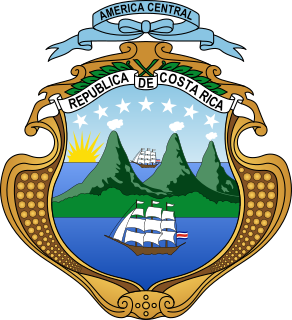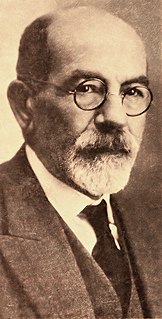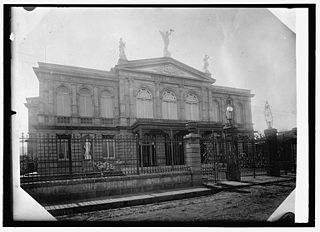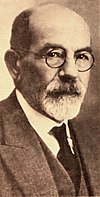Tobías Zúñiga Castro was a Costa Rican politician. He served as a diplomat and was Secretary of State. He was a member of the People's Party.

General elections were held in Costa Rica on 7 December 1913, the first direct elections since 1844. They were also the first elections to have universal male suffrage, after economic and educational requirements were eliminated. Máximo Fernández Alvarado of the Republican Party won the presidential election, but both he and runner-up Carlos Durán Cartín later resigned and Alfredo González Flores was appointed president by Congress on 8 May 1914. The Republican Party also won the parliamentary election. Voter turnout was 78.0% in the presidential election and 78.6% in the parliamentary election.

General elections were held in Costa Rica on 1 April 1917. Federico Tinoco Granados had seized power in a military coup in January and was the only candidate in the presidential election. The elections were considered to be fraudulent and although former president Rafael Yglesias Castro received 249 votes in Alajuela, they were recorded as invalid ballots. Voter turnout was reported to be 69.2% in the presidential election and 67.6% in the parliamentary election.

General elections were held in Costa Rica on 7 December 1919. Julio Acosta García of the Constitutional Party won the presidential election, whilst the party also won the parliamentary election, in which they received 74.9% of the vote. Voter turnout was 57.8% in the presidential election and 42.1% in the parliamentary election.

General elections were held in Costa Rica on 2 December 1923. Ricardo Jiménez Oreamuno of the Republican Party won the presidential election, whilst the party also won the parliamentary election, in which they received 51.5% of the vote. Voter turnout was 70.5% in the presidential election and 83.9% in the parliamentary election.

General elections were held in Costa Rica on 14 February 1932. Ricardo Jiménez Oreamuno of the Independent National Republican Party won the presidential election, whilst the party also won the parliamentary election, in which they received 46.7% of the vote. Voter turnout was 64.2%.

General elections were held in Costa Rica on 9 February 1936. León Cortés Castro of the Independent National Republican Party won the presidential election, whilst the party also won the parliamentary election, in which they received 59.4% of the vote. Voter turnout was 68.8% in the presidential election and 68.9% in the parliamentary election.

General elections were held in Costa Rica on 11 February 1940. Rafael Ángel Calderón Guardia of the Independent National Republican Party won the presidential election. Voter turnout was 80.8% in the presidential election and 65.6% in the parliamentary election.
Events in the year 1906 in Costa Rica.

The National Republican Party was a political party in Costa Rica.

This is a list of foreign ministers of Costa Rica.

The 1906 Costa Rican general election was held during the presidency of Ascensión Esquivel Ibarra. Ibarra openly supported candidate Cleto González Víquez. Other candidates were former president Bernardo Soto Alfaro, former State and Police Secretary Tobías Zúñiga Castro, the also former State Secretary Máximo Fernández Alvarado and former justice and Foreign Secretary Ezequiel Gutiérrez Iglesias. Difference were more personal than ideological as all candidates except Gutiérrez were liberals, and the election had a strong "anti-cletista" component. This "anti-cletismo" was what united the opposition and talks about a common joint front occurred but it was not applied. Gutiérrez was candidate of the conservative "Democratic Union", the party that emerged from the now outlawed Catholic Union.
The 1910 Costa Rican general election was held during the presidency of Cleto González Víquez. This was the last time that indirect elections were held in Costa Rica as for the next one in 1913 the direct vote was implemented. Liberal lawyer Ricardo Jiménez Oreamuno was elected for the first time. Jiménez was very popular in part because of his struggles against the United Fruit Company's abusive operations in the country. Jiménez was proclaimed candidate in the Teatro Variedades during the first Republican National Convention, Costa Rica's first primary election. Jiménez won easily over the other candidate, former president Rafael Yglesias who ruled an authoritarian, though short-lived, regime.
The Partido Agrícola was a political party of Costa Rica. It was founded for the 1923 general election and ran as candidate the wealthy aristocrat and lawyer Alberto Echandi Montero, father of the future president Mario Echandi Jiménez.
The National Party of Costa Rica was a political party formed by liberal groups for the mid-term legislative elections of 1892, which allied with the supporters of the government of President José Rodríguez Zeledón to defeat the Catholic Union; however, a few months later the governor dissolved the Congress. It was an eminently personalist group, with a diffuse liberal ideology. Si bien Yglesias había pedido que se votara por Echandi pues adujo encontrarse cansado.

Liberalism in Costa Rica is a political philosophy with a long and complex history. Liberals were the hegemonic political group for most of Costa Rica’s history specially during the periods of the Free State and the First Republic, however, as the liberal model exhausted itself and new more left-wing reformist movements clashed during the Costa Rican Civil War liberalism was relegated to a secondary role after the Second Costa Rican Republic with the development of Costa Rica’s Welfare State and its two-party system controlled by social-democratic and Christian democratic parties.

The Olympus Generation, also called the 900 Generation, is the name given in Costa Rica to a group of intellectuals, teachers, historians, politicians and writers of liberal and positivist thought, whose ideas and philosophical, political, academic and cultural contributions were reflected in the sciences, arts, literature and politics between 1890 and 1920, this was the historical stage of Costa Rica where the Liberal State is consolidated. Traditionally, they're known as the Olympus generation in reference to the Olympian gods of classical mythology, because most of them belonged to an oligarchic elite with political and economic power obtained from the international coffee trade during the second half of the 19th century. This was the nickname given by their detractos due to the arrogance of many of its members. The Olimpo generation played a leading role in the gestation of culture, national identity and the consolidation of the Costa Rican State.

It is known as the Liberal State the historical period in Costa Rica that occurred approximately between 1870 and 1940. It responded to the hegemonic dominion in the political, ideological and economic aspects of liberal philosophy. It is considered a period of transcendental importance in Costa Rican history, as it's when the consolidation of the National State and its institutions finally takes place.

The Reform State or Reformist State is a period in Costa Rican history characterized by the change in political and economic paradigm switching from the uncontrolled capitalism and laissez faire of the Liberal State into a more economically progressive Welfare State. The period ranges from approximately 1940 starting with the presidency of social reformer Rafael Angel Calderón Guardia and ends around the 1980s with the first neoliberal and Washington Consensus reforms that begun after the government of Luis Alberto Monge.










